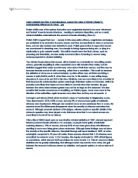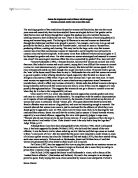Assess the Usefulness of Official Crime Statistics to a Sociological Understanding of Crime
Assess the Usefulness of Official Crime Statistics to a Sociological Understanding of Crime The Government publishes official statistics on crime in Britain annually. The main source of these statistics are gathered from recorded crimes by the police and courts and through the British Crime Survey (BSC) which is a large-scale victim survey conducted annually by the Home Office. The combination of both of these statistics should provide a picture of the full extent of crime in Britain, however, sociologists believe there are a number of factors that influence these figures and that these official statistics do not reflect a true representation of crime in Britain today. We shall explore these factors and perspectives further to assess whether the official statistics do serve a purpose in the reporting of crime in Britain. From the functionalist perspective Emile Durkheim stated that deviance is a necessary part of all societies and that police and the courts are necessary to keep deviance in check and to protect social order. Durkheim argued that crime is an inevitable part of society and that all social change begins with some form of deviance and in order for change to occur, and that yesterday's deviance must become today's normality. That a limited amount of crime is necessary and beneficial to society and that society could not exist without some form of deviance and it
The chivalry thesis claims that women will be treated more leniently for committing certain crimes, generally shoplifting is often associated more with females than males, but the statistics suggest that males commit many more acts of theft than women, an
Using material from Item A and elsewhere, assess the value of 'chivalry thesis 'in understanding differences in crime. gfg Pollak (1950) was of the opinion that police and magistrates tended to be more 'chivalrous' and 'lenient' towards female offenders, resulting in sentence disparities, and as a result, criminal statistics underestimate the amount of female offending. (Item A). Pollak (1961) argued that men - namely in this case police officers, magistrates and judges, are socialised to be protective towards women and thus are less likely to chare or prosecute them, and are also treated more leniently in court. Pollak goes further to argue that women are accustomed to deceiving men, for example in faking orgasms during sex, or lying in a relationship to gain material wealth. This skill in deceit mean that their crimes, such as poisoning and infanticide, are less easily uncovered (item A) leading to women being underrepresented in criminal statistics. The chivalry thesis claims that women will be treated more leniently for committing certain crimes, generally shoplifting is often associated more with females than males, but the statistics suggest that males commit many more acts of theft than women, and this may be because females are let off with a warning rather than a conviction. This could be because the statistics of crime are so male dominated, a police officer may
Asses the arguments and evidence which suggest women commit much less crime than men
Asses the arguments and evidence which suggest women commit much less crime than men The sociology gender of has mostly been focused on women and femininity, but over the recent years men and masculinity has also been studied. Some sociologists believe that gender can be identified as male and female through their organs that produce sex cells and their hormones, enabling women to bear children but not men. There is also the difference of men being physically strong and women being weak. The biological differences in men and women are determined through their behaviour and their roles played in society. For example, men's role is to go out and provide for the family, they're seen as the 'breadwinners', and men are seen as 'housewives', producing children, cooking and cleaning. This may lead to the large-scale view that women commit less crime than men because women are assumed to not having the time and motive to commit crime and men having both. In this essay views from different writers and sociologists will be discussed on gender and crime. For what reasons are women stereotyped and assumed to commit less crime? Can sociological situations affect the crime committed by gender? If so, how and why? Frances Heidensohn (1985), a famous feminist, believes that women do commit less crime than men. She looked at women and social control, saying that it was difficult for women
Evaluate the Functionalist explanations of Deviance.
Sociology Essay Evaluate the Functionalist explanations of Deviance (50 marks) Functionalism has been one of the most important approaches in explaining deviant behaviour. Functionalism has also played an important part in explaining other areas of sociology, such as health and education. In basic Functionalist terms, if something exists in society it must have a purpose for existing, and, since crime exists, it must perform functions for the society. Functionalist explanations look at the implications of crime and crime control policies, rather than directly attempting to explain the causes of criminal behaviour. However, unlike other models that eliminate blame from offenders by claiming criminals have little free will, a functionalist approach favours suppression of criminal activity and the use of appropriate sanctions. The major difference between functionalist and all other theories of crime causation is its apparent positive view of deviant behaviour. Durkheim identified two different sides of crime, a positive side, which helped society change and remain dynamic, and a negative side, which saw too much crime leading to social disruption. He claimed that a limited amount of crime was necessary for any society. Durkheim argued that as societies develop and grow, the collective conscience, or shared values, which guide our actions and provide boundaries, are






